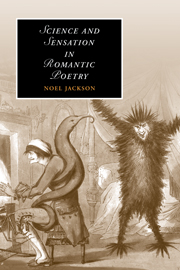Book contents
- Frontmatter
- Contents
- List of illustrations
- Acknowledgments
- List of abbreviations
- Introduction: Lyrical forms and empirical realities: reading Romanticism's “language of the sense”
- PART I SENSES OF HISTORY: BETWEEN THE MIND AND THE WORLD
- PART II SENSES OF COMMUNITY: LYRIC SUBJECTIVITY AND “THE CULTURE OF THE FEELINGS”
- 3 Critical conditions: Coleridge, “common sense,” and the literature of self-experiment
- 4 Sense and consensus: Wordsworth, aesthetic culture, and the poet-physician
- PART III THE PERSISTENCE OF THE AESTHETIC: AFTERLIVES OF ROMANTICISM
- Notes
- Select bibliography
- Index
- CAMBRIDGE STUDIES IN ROMANTICISM
4 - Sense and consensus: Wordsworth, aesthetic culture, and the poet-physician
Published online by Cambridge University Press: 22 September 2009
- Frontmatter
- Contents
- List of illustrations
- Acknowledgments
- List of abbreviations
- Introduction: Lyrical forms and empirical realities: reading Romanticism's “language of the sense”
- PART I SENSES OF HISTORY: BETWEEN THE MIND AND THE WORLD
- PART II SENSES OF COMMUNITY: LYRIC SUBJECTIVITY AND “THE CULTURE OF THE FEELINGS”
- 3 Critical conditions: Coleridge, “common sense,” and the literature of self-experiment
- 4 Sense and consensus: Wordsworth, aesthetic culture, and the poet-physician
- PART III THE PERSISTENCE OF THE AESTHETIC: AFTERLIVES OF ROMANTICISM
- Notes
- Select bibliography
- Index
- CAMBRIDGE STUDIES IN ROMANTICISM
Summary
In the important first chapter of Marxism and Literature, Raymond Williams set out the methodological procedures that had guided his previous examinations of culture and society, and elaborated his vision for a properly materialist history of literary form and expression. Here and throughout his work, Williams stressed the importance of approaching such critical keywords as “culture” not as hypostatized entities but as historical processes – “not concepts but problems, not analytic problems either but historical movements that are still unresolved.” As Williams repeatedly emphasized, “culture” originally signified a process rather than a thing in its own right; until the late eighteenth century, he writes, it “was still a noun of process: the culture of something – crops, animals, minds.” This original sense of “culture” as entailing the cultivation of crops and minds might bring to mind that famous final line of Voltaire's Candide – Il faut cultiver notre jardin – whose call to “cultivation” sounded a rallying-cry for enlightenment aspirations.
The present chapter follows Williams in tracing a context for the conceptual development of aesthetic culture through the century or so (roughly 1750–1850) that Williams designates as crucial. My approach to this concept, however, will not mainly attend to its association with the topos of cultivation, nor even to an emergent distinction – one routinely attributed to the Romantics – between “cultivation” and Enlightenment “civilization.”
- Type
- Chapter
- Information
- Science and Sensation in Romantic Poetry , pp. 132 - 162Publisher: Cambridge University PressPrint publication year: 2008



